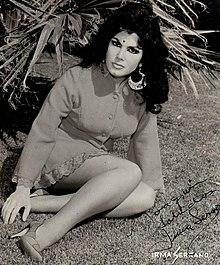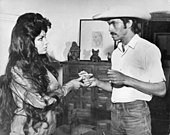music.wikisort.org - Poet
Irma Consuelo Cielo Serrano Castro[1] (Spanish pronunciation: [ˈiɾma konˈswelo ˈsjelo seˈrano ˈkastɾo]; born 9 December 1933) is a Mexican singer, actress and politician.[2] Famous for her "tantalizing", "untamed spitfire" voice,[3] she is one of the most noted performers of the ranchera and corrido genres;[4] she was nicknamed La Tigresa de la Canción Ranchera[5] and later known simply as "La Tigresa" (Spanish pronunciation: [la ti´ɣɾesa]). At the same time, she developed a film career of more than a dozen films. She is one of the last surviving stars from the Golden Age of Mexican cinema.
Irma Serrano | |
|---|---|
 Serrano, c. 1969 | |
| Born | Irma Consuelo Cielo Serrano Castro 9 December 1933 |
| Nationality | Mexican |
| Other names | La Tigresa La Tigresa de la Canción Ranchera |
| Occupation |
|
| Years active | 1962–2005 |
| Partner(s) | Gustavo Díaz Ordaz Alejo Peralta |
| Relatives | Rosario Castellanos (cousin) |
| Musical career | |
| Genres |
|
| Instrument(s) |
|
| Labels |
|
In the 1970s and 1980s, Serrano achieved great success as an actress and producer in a series of controversial stage plays, highlighting the controversial play Naná (1973). In the decade of the 1990s, she also ventured into politics and occupied a seat in the Mexican Senate. In her later years, she was the center of multiple scandals and controversies.[6] She has appeared in celebrity gossip magazines and television shows because of her political career as senator of her home state of Chiapas from 1994 to 1997.
Early life
Serrano is the third of three children (Mario, Yolanda, and Irma). Her father, Santiago Serrano Ruiz "El Chanti" (25 July 1897 – 17 December 1957),[7] was a distinguished author, poet, and politician born in Suchiapa.[8] Her mother, María Castro Domínguez,[9] was a local aristocrat who owned various haciendas.[10] Her older siblings were Mario and Yolanda. Her parents divorced when she was 7 years old.[10] She is a cousin of poet, author, and diplomat Rosario Castellanos.[10]
Career
Music
Irma Serrano began her artistic career as a dancer in the choreographic group directed by the dancer Chelo La Rué. Later, Serrano began her career as singer when signing a contract with Columbia Records in 1962.[11] In 1963, she won several awards such as the Folklore Revelation Trophy, the Macuilxóchitl as the Revelation Songwriter and the Musa Trophy of Radiolandia.[11] Serrano became one of the most popular Mexican folk music artists of the 1960s. One of her most remembered songs is the corrido of La Martina, considered a classic of the Mexican folk genre.[citation needed]
Film

She began her career in films at age 29 in the movie Samson vs. the Zombies, starring the popular Mexican wrestler El Santo (Samson).[citation needed] She works on films like The Extra (1962), opposite Cantinflas, Tiburoneros (1963, directed by Luis Alcoriza), and Gabino Barrera (1964) along with the actor and singer Antonio Aguilar, among others. From 1968, begins to use the pseudonym of La Tigresa (The Tigress), taken from a comic that she herself starred due to its popularity. In the 1970s she participated in her best films. In 1972, she stars in La Martina", inspired by her most popular song. In 1973 she starred in the fantastic film La Tigresa. In that same year, she works in the film The Monastery of the Vultures of the filmmaker Francisco del Villar.[citation needed]
At the end of the 1970s and during the 1980s, Serrano's appearances at the movies were rather sporadic. She performs special performances in films like Cabaret Nights (1978) and Lola la trailera (1982). In 1985 Irma produces Naná inspired by the controversial same name stage play, which she herself starred in Mexico years ago. In 1986, Serrano made her last relevant film performance in the horror film The Lovers of the Lord of the Night next to Isela Vega and Emilio Fernández.[citation needed]
Theater

In 1972, Serrano acquired the old Virginia Fábregas Theater, located in the street of Donceles, in the Mexico City's Historic Center. The actress remodeled the theater and renamed it Teatro Fru Fru.[12] From the 1970s, Serrano stars and produces a series of theatrical montages that caused controversy. Of them it emphasizes Naná (1973), a free adaptation of Serrano of the same name novel of Emile Zola. The stage play was produced by Serrano and directed by Maricela Lara. Naná caused controversy in Mexico because of its high erotic content, and remained on the billboard for four uninterrupted years (1973-1977).[citation needed]
In 1977, Serrano partnered with actor, producer, writer and director Alejandro Jodorowsky to perform the stage play Lucrecia Borgia. Nevertheless, the differences between both personages provoked a dispute that caused that both independently produced its own version of the work.[13]
Other stage plays starring by Serrano in the Teatro Fru Frú were A Lady Without Camelias (1977), Oh ... Calcutta (1977), Yocasta Reina (1978), The Cross-legged War(1979) and the autobiographical A calzón amarrado (1980, based on the controversial autobiographical book published by La Tigresa a little earlier). In addition to starring in these works, Serrano also served as co-producer, co-director and co-author of the arguments, some along with the director, actor and producer Pablo Leder.[citation needed]
Her last theatrical projects were The Two Emanuele (1984, alongside Isela Vega and also represented in the Million Dollar Theater of Los Angeles) and The Well of Solitude (1985).[citation needed]
As a producer, she also performed a series of theatrical productions, some of them within the successful concept Theater at the Midnight, created by Pablo Leder for a strictly adult audience. Such montages were Emanuele LIVE (1981), Jail for Girls (1981), Vampira! (Emanuele de ultratumba) (1983) and Carmen (2004).[citation needed]
Personal life
It was rumored that Serrano and Mexican president Gustavo Díaz Ordaz had a short-lived romantic affair.[6] Neither confirmed the rumor until she published her book A calzón amarrado, in which the romantic adventure was confirmed.[citation needed]
In 1994, Serrano ran for Senator from her home state of Chiapas and won.[6]
On March 25, 2009, Serrano was arrested in her home State of Chiapas and taken into custody to Mexico City's federal.[14]
Serrano resides in Comitán, Chiapas.[citation needed]
Filmography
This section does not cite any sources. (October 2022) |
|
|
Television
- 2005 La Madrastra (TV series)
- 2004 Hospital el paisa (TV series)
- 1977 Variedades de media noche (TV series)
- 1974 La tierra (TV series)
- 1972 Aun hay mas (TV series)
Theater
Actress and Producer
- Naná (1973)
- A Lady Without Camellias (1977)
- Oh...Calcutta (1977)
- Lucrecia Borgia (1977)
- Yocasta Reina (1978)
- The Cross-legged War (1979)
- A Calzón amarrado (1980)
- The Two Emanuele (1984)
- The Well of Solitude (1985)
Producer
- Emanuele...Live (1981)
- Jail for Girls (1981)
- Vampira! (Emanuele de Ultratumba) (1983)
- Carmen (2004)
Selected discography
- La Nueva Intérprete de la Canción Ranchera (Columbia, 1964)
- Lloren Organillos: Folk Songs of Mexico (Columbia, 1965)
- Nuevo "Hits" con Irma Serrano (Columbia, 1965)
- Mexican Fire (Columbia, 1966)
- Mi Noche de Ayer and Other Folk Songs (Columbia, 1968)
- Irma Serrano con Los Alegres de Terán (Columbia, 1973)
Awards
- 1963: Trofeo Revelación Folkórica, Premio Macuilxóchitl como la Cancionista Revelación, Trofeo Musa de Radiolandia.
Bibliography
- SERRANO, Irma / ROBLEDO, Elisa A calzón amarrado Ed. Selector, México (1978) ISBN 9684031645
- SERRANO, Irma / ROBLEDO, Elisa Sin pelos en la lengua Ed. Selector, México (1979) ISBN 9786074530315
- SERRANO, Irma / ROBLEDO, Elisa Una loca en la polaca, Ed. Selector, México (1992) ISBN 9684036493
References
- Decisión Ciudadana 1994: Reglas del juego, candidatos y perspectivas. Rayuela Editores. 1994. p. 70. ISBN 9789687293035. Retrieved 16 June 2014.
- "Biographical Dictionary of Mexican Film Performers: "S" - Serrano, Irma". Retrieved 30 May 2011.
- "The Whirling Disks: Irma Serrano". Reading Eagle. 20 March 1966. Retrieved 5 June 2014.
- Herrera-Sobek, María (1993). The Mexican Corrido: A Feminist Analysis. Indiana University Press. p. xviii. ISBN 9780253207951.
- Contreras, José A. (10 March 1966). "Irma Serrano sintetiza: Canta con sinceridad para el pueblo". Melodías mexicanas. Retrieved 18 June 2014.
- "Mexican Actress Irma Serrano Arrested". Latin American Herald Tribune. Retrieved 2010-07-18.
- Sánchez, Alejandro. "Santiago Serrano, poeta de Suchiapa casi olvidado". Noticiasnet. Retrieved 14 July 2014.
- Manguen, Juan Jaime; Montesinos, Irma (1992). Los Chiapanecas, guerreros de la historia: pobladores de Suchiapa, Volume 1. Gobierno del Estado de Chiapas. p. 204.
- El libro y el pueblo 60. Departamento de Bibliotecas de la Secretaría de Educación Pública. 1970. p. 31. Retrieved 16 June 2014.
- Poniatowska, Elena (1993). Todo México, Tomo 1. Editorial Diana. pp. 115–117.
- "Notas sobre Irma Serrano en su LP, Lloren organillos". Retrieved 19 June 2014.
- Máspormás.com: Habitantes del...Teatro Fru Frú
- Jodorowsky, Alejandro (2012). El maestro y las magas (The Master and the Witches). Siruela. ISBN 9788498419801.
- "Irma Serrano es detenida tras asistir al programa 'Hoy'". Terra (Mexico) (in Spanish). March 25, 2009. Retrieved 2010-07-18.
External links
- Irma Serrano discography at Discogs
- Irma Serrano at IMDb
На других языках
[de] Irma Serrano
Irma Serrano (* 9. Dezember 1933 als Irma Cielo Consuelo Serrano Castro y Domínguez in Comitán de Domínguez, Mexiko) ist eine mexikanische Musikerin, Schauspielerin, Drehbuchautorin, Filmproduzentin und Politikerin.[1][2] Ihr Spitzname ist „La Tigresa“ („die Tigerin“), benannt nach einem ihrer bekanntesten Filme.- [en] Irma Serrano
[es] Irma Serrano
Irma Consuelo Cielo Serrano Castro (Comitán de Domínguez, Chiapas; 9 de diciembre de 1933), conocida de forma simple como Irma Serrano, o también como La Tigresa, o La Tigresa de la Canción Ranchera, es una cantante, actriz y política mexicana.[1][ru] Серрано, Ирма
Ирма Консуэло Сьело Серрано Кастро (исп. Irma Consuelo Cielo Serrano Castro [ˈiɾma konˈswelo ˈsjelo seˈrano ˈkastɾo]; род. 9 декабря 1933, Комитан, Чьяпас, Мексика) — мексиканская актриса театра и кино, композитор, певица, писательница, политический деятель, предприниматель, продюсер, режиссёр и танцовщица.Другой контент может иметь иную лицензию. Перед использованием материалов сайта WikiSort.org внимательно изучите правила лицензирования конкретных элементов наполнения сайта.
WikiSort.org - проект по пересортировке и дополнению контента Википедии